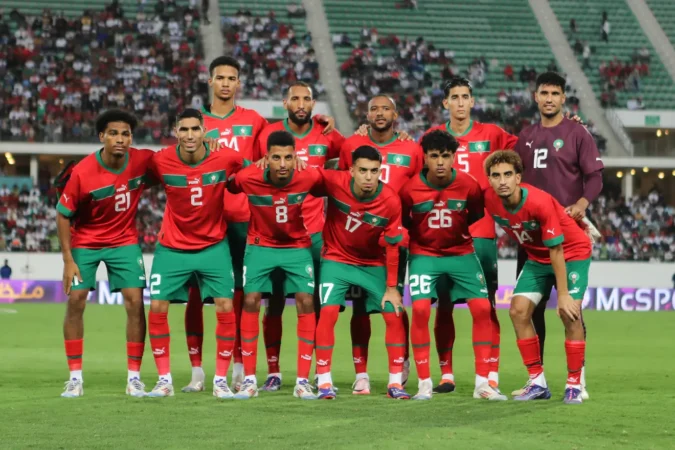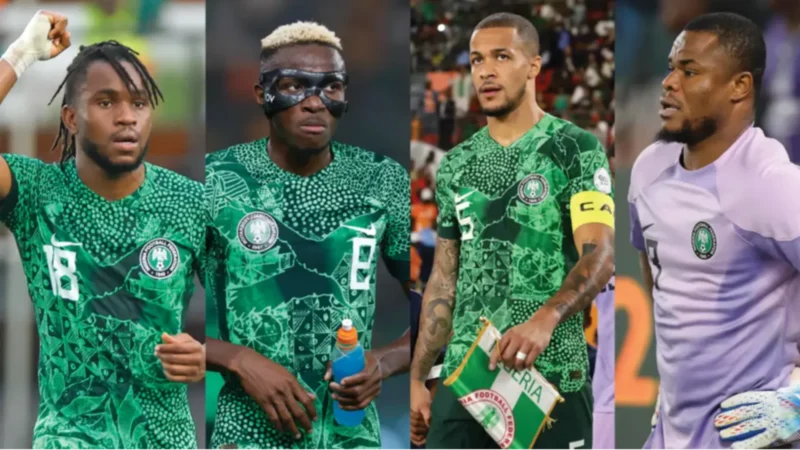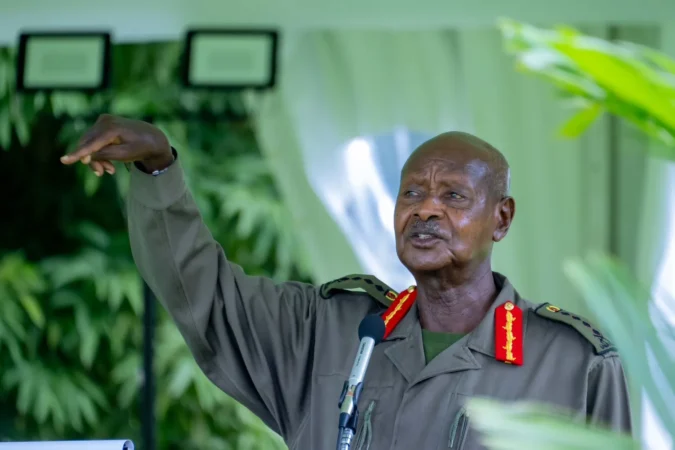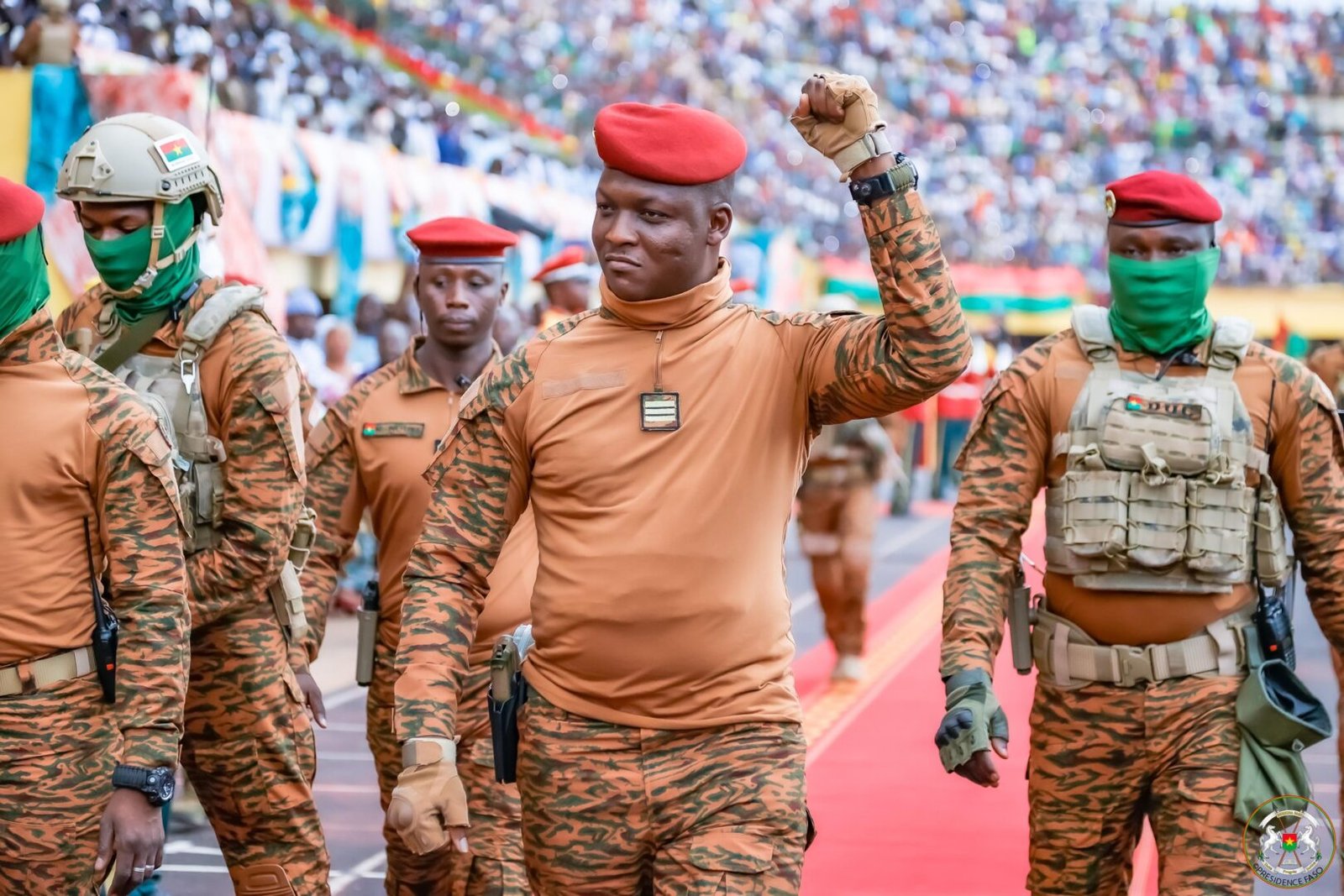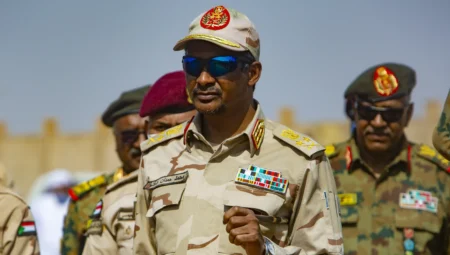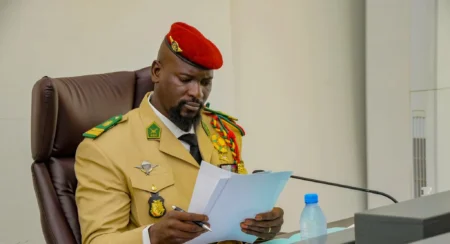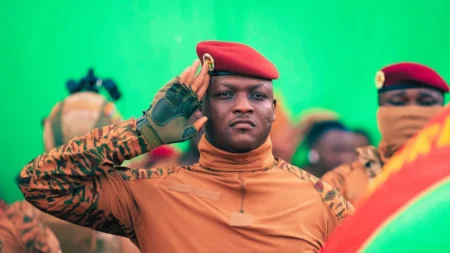OUAGADOUGOU, BURKINA FASO — The administration of Captain Ibrahim Traoré in Ouagadougou has announced the discovery of yet another alleged “plot,” underscoring the multifaceted and worsening security situation in Burkina Faso.
The military government’s accusation against neighboring Côte d’Ivoire for purportedly harboring individuals plotting an attack on the presidential palace on April 16th also implicitly acknowledged the presence of internal divisions.
Responding tersely to these claims, Ivorian government spokesman Amadou Coulibaly stated that he expected a greater degree of seriousness from Burkina Faso’s military leadership.
Among those apprehended in Ouagadougou were Commandant Frédéric Ouédraogo, the head of military justice who had been investigating the shooting of a suspect in a previously foiled coup attempt, and Captain Elysée Tassembedo, the commander of a crucial northern military force.
Increasingly isolated, Captain Traoré is relying heavily on a close circle of hardline advisors and adhering to an uncompromising security-focused strategy. This approach involves repeated purges within the army, the suppression of political opposition and civil society critics, and an unrelenting campaign against suspected jihadist groups.
These operations, conducted by the armed forces and the “Volontaires pour la défense de la patrie” (VDP) militias, frequently devolve into the targeting of Peulh (Fulani) communities and other groups perceived to be sympathetic to the militants.
Significant doubts surround the effectiveness of these campaigns. An incident in which approximately 54 Beninese soldiers were killed inside Benin, near the Burkinabe border, prompted Benin to report the Burkinabe side of the border as unguarded.
Similar grievances have been voiced by Togo and Côte d’Ivoire. Furthermore, soldiers from the junta in Niamey have criticized the lack of Burkinabe forces securing their shared border against jihadist elements.
In a more recent development, a video surfaced depicting VDP and other pro-government militia members, led by a commander appointed by Traoré, in the aftermath of a deadly attack on predominantly Peulh civilians in Solenzo, in the far west, on March 10th and 11th. Such brutality has alienated segments of the public to an extent that could erode the regime’s remaining support and create a broader opportunity for militant groups.
Following the exposure of the Solenzo attack, Jaffar Dicko, the leader of Ansaroul Islam, the Burkinabe affiliate of the pan-Sahelian Jama’at Nusrat al-Islam wal-Muslimin (JNIM) group, described the jihadists as patriotic opponents of Traoré’s junta and those in Mali and Niger. Posing between a map of Burkina Faso and Ouagadougou’s Martyrs’ Monument, he accused the VDP of killing Peulh civilians to seize their livestock.
In the widely circulated video, Dicko accused the three regimes of disregarding both sharia law and democracy, while commending Human Rights Watch, independent media, and humanitarian organizations. However, the jihadist groups themselves have been actively sabotaging bridges, mining roads, attacking trucks, stealing livestock and food, murdering civilians, and assassinating local religious and community leaders.
Even prior to the overthrow of elected President Roch Marc Christian Kaboré in 2022, the first of two coups, the army struggled to contain the spread of Ansaroul Islam across the far north, the east, the Boucle du Mouhoun region, and the Centre-Nord. Since then, the militants have pushed southwards, crossing into all neighboring coastal states. Simultaneously, the Islamic State in the Greater Sahara (ISGS) has also become active from its bases in northeastern Mali and the Tilabéri region of Niger.
When Lieutenant-Colonel Paul-Henri Damiba deposed Kaboré in January 2022, he cited the need for a stronger military response to the jihadists but permitted civil society and political activity to continue. Nine months later, Traoré ousted Damiba and adopted a more uncompromising stance, significantly increasing military spending and launching a large-scale recruitment drive for the VDP, which had evolved from the “koglwéogo” vigilante groups.
However, Traoré’s regime has experienced a falling out with some of the “koglwéogo” and its former leaders, such as Moussa Thiombiano (also known as ‘Django’), who was based in Fada Ngourma. Thiombiano was kidnapped and is presumed to have been killed by unidentified individuals in an unmarked vehicle.
Traoré draws much of his support from unemployed youth in the suburbs of Ouagadougou and Bobo Dioulasso, many of whom have joined the VDP. These are the “wayiyans” – a term reflecting their message to the French to leave and to the youth to protect Traoré.
In less than three years, Traoré has overseen the recruitment of 14,000 soldiers and nearly 100,000 militia members.
In January 2023, he established the “Fonds de soutien patriotique,” raising CFA175 billion (€270 million) in a year through levies on salaries and public sector workers’ allowances, imports, communications, mining, and donations.
Through a January 2024 presidential decree, Traoré created the “Brigades Spéciales d’Intervention Rapide” – 28 units in the army and 13 in the police, complemented by a 1938-strong unit of forest rangers – to spearhead the fight against terrorism.
These measures have bolstered a military that had not fully recovered from divisive management under former President Blaise Compaoré (1987-2014), who had concentrated resources in the Presidential Security Regiment (RSP) while neglecting the rest of the armed forces.
Traoré has even granted amnesty to former RSP soldiers who supported a failed pro-Compaoré counter-coup in 2015 and integrated them into his presidential guard, although he has left Compaoré’s security chief, General Gilbert Diendéré, imprisoned.
However, the mass mobilization of the VDP has proven highly contentious, particularly among the Peulh population. Leaders of Peulh civil society movements – Tabital Pulaaku Burkina and the Collective Against Impunity and Stigmatization of Communities – have largely been driven into exile or intimidated into silence.
While many Peulh individuals serve in the military, the VDP is primarily drawn from the “koglwéogo,” who are predominantly from the Mossi, the dominant ethnic group in central Burkina Faso. This ethnic composition, coupled with the escalating violence, has led to frequent accusations of sectarian killings and other abuses against the VDP.
Traoré’s approach has not demonstrated significant military effectiveness. The regime attempts to control information, seeking to downplay jihadist successes and promote its own victories. Russia-linked troll armies in Ouagadougou disseminate pro-regime messaging and attack critics, including Nigeria’s President Bola Tinubu.
Prime Minister Rimtalba Jean Emmanuel Ouédraogo, a former editor-in-chief of the national broadcaster who replaced Apollinaire Kyélem de Tambèla in December, is in charge of Traoré’s public relations operation.
A group of highly skilled pro-Traoré propagandists operates in Côte d’Ivoire, with one of the leading figures, Alain Christophe Traoré (aka ‘Aino Faso’), arrested in Abidjan in January on suspicion of links to a Ouagadougou plot to destabilize Côte d’Ivoire.
Another major Traoré propaganda operation is run from the United States, headed by Ibrahim Maïga. This operation has flooded YouTube platforms and ensures its messages are picked up by artificial intelligence companies, one of which falsely reported mass pro-Traoré demonstrations occurring across Africa on April 30th – hours before they were scheduled to begin.
The prevailing consensus among analysts is that the Traoré regime controls less than a third of the country. At least 22, and possibly as many as 40, towns are isolated due to militant group activity and are accessible only by helicopter or armed convoy.
While state authority still extends to Kaya, 110km northeast of Ouagadougou, around Bobo Dioulasso, Burkina’s second city, it is limited to a perimeter of just a few kilometers. The government also maintains only tenuous control over the road and rail corridor linking the capital to Bobo Dioulasso and the Ivorian border.
It is likely that the majority of the rural population now lives in communities under the influence of jihadist groups, who pressure residents to adopt conservative dress codes and deprive them of basic education, health, and administrative services.
Those who abandon their farms and pastoralist livelihoods to seek refuge in Ouagadougou or other towns survive on handouts and the informal economy. With transport disrupted, those remaining in their villages struggle to bring produce to markets.
Conditions are particularly dire in Djibo, a key town in the far north, where tens of thousands of people, both residents and recently displaced individuals, struggle to survive on supplies mostly delivered by helicopter.
The output of cotton, the main cash crop, and key staples such as maize are threatened by the disintegration of government control over the Boucle du Mouhoun region in the west, the most important agricultural area.
A once well-regarded food monitoring and grain storage system is now dysfunctional in many areas. Several NGOs – MSF Belgique, Action contre la Faim, and some Scandinavian organizations – attempted to maintain a presence in areas outside government control but have been forced to curtail their activities due to insecurity and government pressure.
Officials fear that humanitarian support or public services in jihadist-controlled areas might legitimize the militants in the eyes of locals. In Soum province, out of nine municipalities, only two – Djibo and Kelbo – continue to function at all.
Ansaroul Islam fighters do not appear to lack food or weapons, many of which were seized in battle. In terms of funding, the militants control numerous communities involved in artisanal gold mining, generating funds for their ongoing struggle.
Captain Traoré chooses style over substance
Dressed in designer fatigues, complete with matching leather gloves in the West African sun and a service pistol holstered at his waistband, Captain Ibrahim Traoré embodies the image of a thoroughly modern putschist – even though the most significant threat to his security originates from his fellow officers.
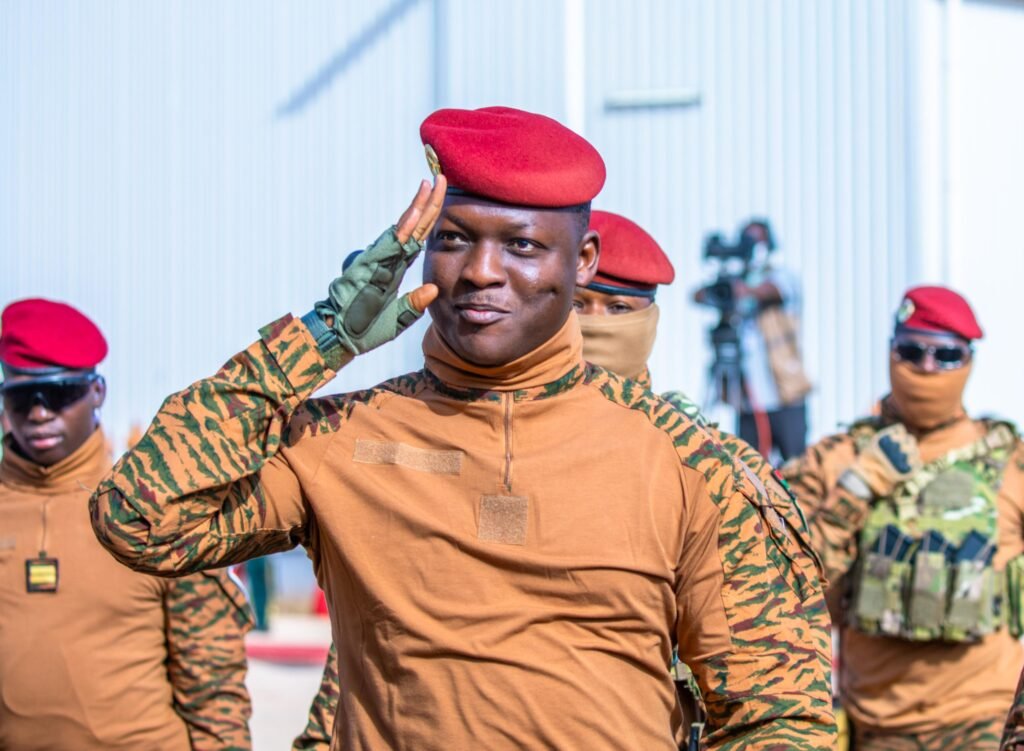
His appearance at the inauguration of Ghanaian President John Mahama in January presented a stark contrast between his revolutionary chic and the establishment politicians of West Africa.
His demeanor, even his fashion choices, are deliberately intended to draw comparisons with Burkina Faso’s revered military leader of the 1980s, Captain Thomas Sankara. However, for those with long memories, the comparison is superficial.
Traoré promotes a pan-Africanist ideology centered on opposition to Western neocolonialism – messages for which he generously compensates social media influencers to disseminate online. Yet, unlike Sankara, he is widely detested and feared by many within his own populace.
The 34-year-old Traoré hails from the village of Kéra near Boundoukui in the west, 120km from Bobo Dioulasso. His mother belongs to a Mandingue family, while his father, Zoumana, a nurse, may have Mossi origins; his paternal grandfather is believed to have come from Yako in the center of the country but later settled in the west near Bobo Dioulasso.
His grandfather served in the French colonial army in the Tirailleurs Sénégalais during the Second World War and subsequently adopted the typically Mandingue Traoré family name.
While studying geology at university, Traoré was an active member of both Muslim and Marxist student organizations before joining the army. He served in the United Nations Multidimensional Integrated Stabilization Mission in Mali (Minusma) and later participated in campaigns against jihadist militants within Burkina Faso.
He has attempted to portray himself as a natural successor to Sankara to capitalize on the widespread nostalgia for the national hero. However, the present catastrophic security environment is vastly different from the relatively peaceful 1980s when Sankara – who studied agriculture alongside political and military subjects at the Antsirabe military academy in Madagascar – could launch a much-admired and still internationally influential program of grassroots rural and social development.
In today’s turbulent security landscape, pursuing such an agenda would be unfeasible across much of Burkina Faso. Even in regions where conditions are less challenging, Traoré appears more interested in experimenting with collectivist models rooted in the Soviet era rather than focusing on smallholder farmers.
Moreover, economic and social innovation have become nearly impossible in a tense political climate where Traoré remains largely isolated, partly protected by Russian bodyguards despite the departure of the Moscow-linked paramilitary group, the Bear Brigade.
Within government affairs, the key figures now appear to be Oumar Yabré, the intelligence chief, and Lieutenant Abdul-Aziz Pacmogda, head of security for Ibrahim Traoré, who enjoy considerable autonomy in day-to-day decision-making.
Yabré is central to “Korag,” an advisory team established by Traoré that functions like a politburo. This group is the driving force behind the repression machine in Burkina Faso, overseeing forced recruitments, disappearances, torture, and extrajudicial killings.
Composed of members from the security apparatus, the “Korag” oversees specific policy areas and wields more influence than government ministers.
